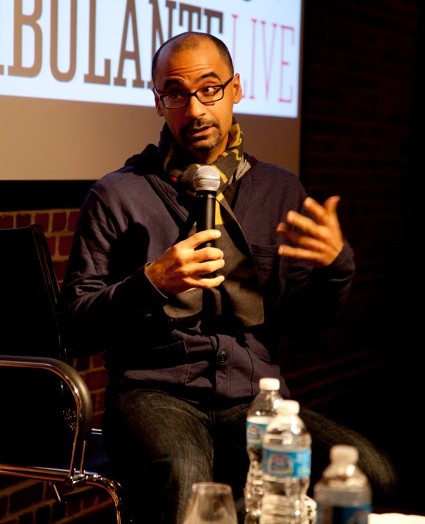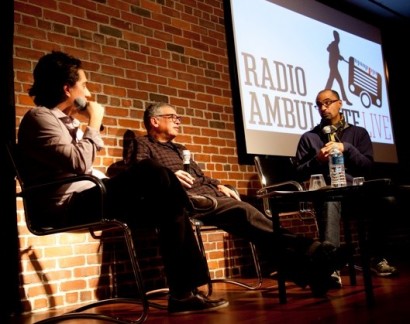About a year ago Feet in 2 Worlds reported on an ambitious new project seeking to revolutionize the Spanish-language airwaves. Radio Ambulante, developed by novelist Daniel Alarcón, is a radio program firmly rooted in storytelling.
Over the past year, Radio Ambulante has been picked up by Spanish-language radio stations in the U.S. and across Latin America and developed a healthy podcast following. Taking inspiration from This American Life, Radio Ambulante tells compelling and surprising stories with themes like miracles, migration and names.
The team behind the project is bilingual and passes fluidly between the English-speaking and Spanish-speaking worlds, But the radio audience generally excludes those who do not speak Spanish. So far, there are only three stories in English available on the program’s website.
To address non-Spanish speakers—and raise funds for the project—Radio Ambulante presented its first live event last week to an enthusiastic crowd at the Cervantes Center in New York City. It was an innovative, truly bilingual experience that may serve as a model for how to communicate across a language barrier.
The evening began with a conversation between award winning writers Junot Díaz and Francisco Goldman on the subject of bilingualism and storytelling. “I use language to help unlock another world,” Diaz said during the discussion. When the radio portion of the evening began, that’s exactly what happened—doors opened into multiple worlds.
Nancy López took the audience to the bottom of a boat making its way to New York from Callao, Peru, where two stowaways struggle to remain alive in darkness and hunger. While she narrated her radio story live on stage, her characters’ voices and the sound of the ocean were woven into the room seamlessly through speakers. Though López spoke in Spanish, subtitles were projected onto a screen behind her, allowing English-speakers to sail with her on the journey.
Following López, Annie Murphy told a story about a Honduran family’s history of exile. Murphy spoke in English, while a Spanish translation was projected behind her. Afterwards, former Fi2W journalist Annie Correal transported the audience to a town in Colombia, where people pull bodies out of a river and engage in a bargain with the unnamed souls.
The highlight of the evening was when Alarcón took the stage and presented a story about his father. As a child in Peru, Renato Alarcón became so skilled at mimicking live radio soccer commentary that he was asked to make up games and perform in front of audiences. At the end of the story, Alarcón invited his father to come up to the stage and create an imaginary soccer game. It was Peru vs. Brazil…and Peru won.
Radio Ambulante LIVE achieved something rare. Unlike many events that attempt bilingualism, there was no sense that the translation was dumbed-down; nor a feeling of boredom due to pauses for interpretation. The producers understand how to tell a good story, and how to use technology intelligently to tell those stories to a diverse audience.
Fi2W is supported by the David and Katherine Moore Family Foundation and the Ralph E. Odgen Foundation.





